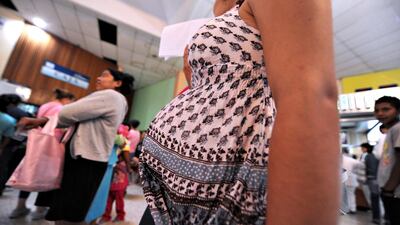The drugging, abduction and gang rape of a 16-year-old girl in Rio de Janeiro prompt us all to turn the tide of sexual violence against girls and women in Brazil as well as in other parts of the world.
The matter came to light when the perpetrators boastfully posted the images of the crime, deepening her pain and agony. The impunity with which these criminals acted was astonishing. It is Brazil's moment to shake the attackers’ confidence to the core and to reassert the rule of law and respect for human rights. This is the time to show zero tolerance for violence against women and girls.
The men's casual expectation of zero retribution reflects the attitude we see in rapists all over the world. Their confidence illustrates not just an environment where violence against women and girls is treated as normal, but it also demonstrates a failure of the justice system.
It is estimated that only 35 per cent of rape cases in Brazil are reported, even though the Brazilian police record a case of rape every 11 minutes.
What's surprising is that the rape victim did not get any medical attention until the incident was made public. Some of the reasons for the gross underreporting of sexual violence are fear, shame and hopelessness. Far too few women and girls are getting the help they need – and entitled to – to support healing and protection from unwanted pregnancy, as well as from HIV and other sexually transmitted diseases.
One simple fact illustrates this: alongside the high rates of sexual violence experienced by women in Brazil and throughout the region, 56 per cent of pregnancies in Latin America and the Caribbean are unplanned or unintended. Women and girls need access to the full range of reproductive health services and rights at all times.
The lack of access to these critical services in Brazil and elsewhere has come more under the spotlight because of the unprecedented spread of the Zika virus.
Those most vulnerable – who are unable to protect themselves adequately against infection or against unwanted pregnancy, especially in the context of rape – face the maximum risk. It has never been a more urgent to take action against sexual violence and give women and girls the opportunity to confidentially and easily access health care services they need. Legal and medical establishments alike need to be mobilised to deal with the existing cases as well as to set up comprehensive services for victims.
This one case throws light into the daily discrimination and intimidation experienced by women and girls, not just in Latin America but all over the world. Violence against females deeply damages our society, economy and our long-term global potential. It constrains lives and limits options.
In all its forms, from physical brutality against female human rights defenders such as Berta Cáceres, who was murdered in western Honduras in March, to the character assassination of female political figures, injustice against women plays out daily. This explains why increased representation of women in leadership positions is so important. This is also why it is so difficult to achieve it.
The intensity of the protest in Brazil on social media reflects the deep anger against the unrecognised or undeclared abuses that have suppressed or extinguished so many women's lives.
Despite women struggling against these odds for so many years, governments have just started to share their vision of a world without violence by 2030.
Our zero tolerance towards the crimes against women needs the full weight of the laws in place to track down, prosecute and punish perpetrators.
From the highest levels of government to the lowest, every individual and entity needs to act with renewed responsibility and accountability for what is happening to women and to understand the real costs and consequences.
More importantly of all, every person needs to understand the situation and take a stand against this dark culture.
Dr Phumzile Mlambo-Ngcuka is UN Undersecretary-General and Executive Director, UN Women

